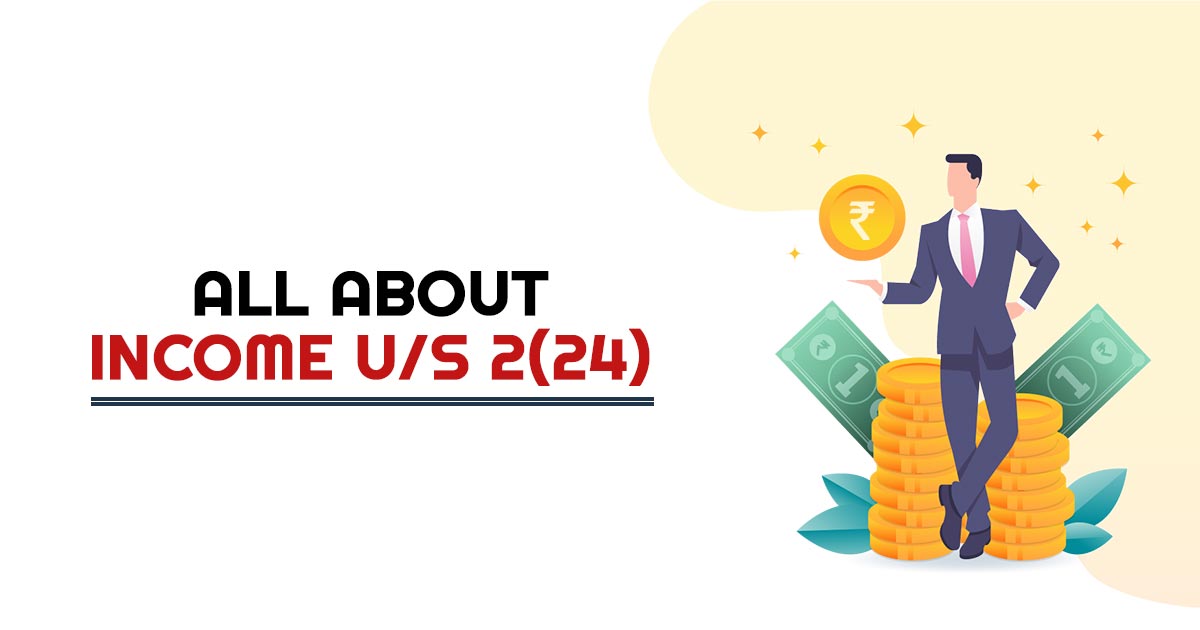
Income can be defined through the earnings of the person when he gets compensation for his work, services, or investments. For the businesses, the income is directed to the revenue which is being generated by the businesses by selling their goods or services from their operations.
The definition and explanation of income are given in 2(24) of the Income Tax Act, 1961. Under the Income Tax law various facts of Gross Income, along with all the revenue sources and taxable income is the total income minus expenses and other adjustments. The income made via sources of any type for instance money and property rendered is adjusted and decreased by the permitted deductions. The same money would be susceptible to income tax.
5 Types of Income You Should Know
Under the income tax act comprehensible, to make the exhaustive definition of the income. The income would get divided into a total of 5 classes.
Salary Income
Initial income is the salary that consists of any remuneration an individual obtains in any service exchanged beneath the employment contract. The same sum is eligible for the income tax consideration when the relationship of the employer-employee is good between the payer and the payee. The salary; advance compensation, pension, commission, gratuity, perquisites, and yearly bonus must be engaged in the salary. The salary would get taxed on the left or obtained basis, whichever is earlier.
The whole amount would get taxed post to making the total aggregate of the total amount of the income with zero exemptions. Full tax will be applied to the basic salary along with the commissions and bonuses.
Head Salary Comprises Several Allowances
Below are the complete details of several allowances which come under the head salary.
Leave Travel Allowance
If you are on a holiday then the expense needed for the travel is said to be the leave travel allowance or LTA as the same would be subject to be paid, the same is free from tax twice over 4 years.
Conveyance Allowance
Up to Rs 800 per month would get waived off from the tax.
House Rent Allowance
HRA can be taken to lower taxes through the person who resides in the rented house.
Medical Allowance
Medical expenses up to Rs 15000 for a year would be free from the tax. For the family of the person, the medical expense is included.
House Property Income
For the income tax, a void residential property would be acknowledged as self-occupied. When an assessee owns more than one self-occupied house then only one is considered as house property while the other is said to be let out. Any commercially owned property would be levied to tax. Some of the conditions should attain for the income via housing property to get taxed.
- A house, a building, or any land should be engaged in the house property
- The assessee must be the owner of the property
- The assessee might not use the residential property for any firm or for the professional purposes where he or she is engaged in
- When these conditions match, the income made via a home property is subjected to be charged and a tax deduction shall be applicable
Business or Professional Income
The money made via profits of the business as well as the profession would be rendered to the calculation of total income. The difference between the collected revenue and the expenses would get levied.
The income made through performing the trade or through the services of the professional would get taxed. under the Income Tax Act’s head of income the gains made from the sale of the imported goods, incentives, any interest, any wage or bonus, and a commission.
Beneath the heading, the income would be eligible for tax:
- Profits are made across an assessment year.
- The profits, salary, or the bonus obtained through working as a partner in a company.
- The gains are made from the revenue of the company.
- The profits incurred through the selling of the particular license.
- Beneath the policy of the government, the cash is obtained according to the export report of individuals.
Capital Gain Income
When a person poses gains from the sale or transfer of the capital asset would be directed as capital gains. The capital gains would be earned on the grounds of the investment incurred by the person towards the business or profession. The capital gains comprise the income made from investments in real estate and other assets.
There are two kinds of gains long term and short-term capital gains. A long-term capital gain is said to be the gain incurred on an asset transfer after 36 months or 3 years since its acquisition, and the short-term capital gain is defined as the gains made when a person sells his assets within the duration of 36 months of 3 years.
Additional Source Income
The same class consists of all the additional kinds of income that do not settle in the above-stated class. The same class consists of the income made via interest on bank deposits, prizes, and additional sports prizes. Under section 56(2) of the income tax act money received in excess of Rs 50,000 from a 3rd party who is not a relative, spouse, etc. will be qualified for tax.
The income beneath the above heads is acknowledged as Income for tax purposes. The taxation along with the income of the person might differ in every fiscal year. If it is known beneath which slab the income counts, the same would be easier to learn and prepare for the taxes.